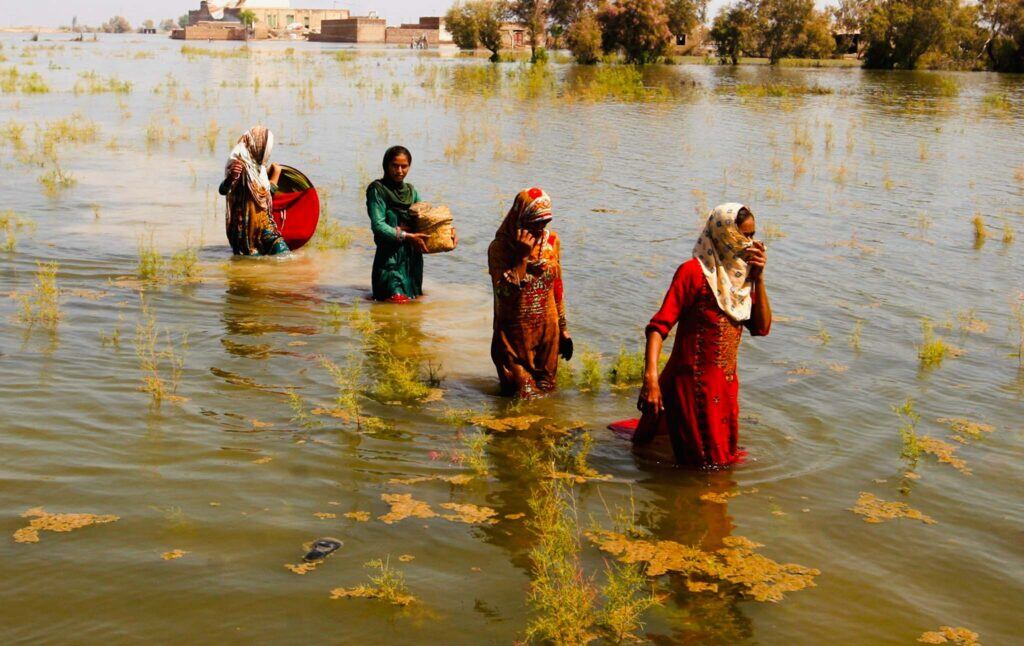
Climate Catastrophe Is Theft
Those who caused the bulk of the climate crisis owe damages to those who are harmed by it. If U.S. emissions cause flooding in Pakistan, the U.S. must compensate Pakistan.
The floods in Pakistan at the moment are apocalyptic. They have displaced tens of millions of people, killed well over 1,000, and left a third of the country underwater. The Prime Minister says that “village after village has been wiped out” and “millions of houses have been destroyed.” The damage will be in the tens of billions and many people’s lives will never be the same.
A Reuters report on the disaster explains the link between the unprecedented severe flooding and global climate change:
The level of disruption in Jacobabad, where many people live in poverty, demonstrates some of the challenges extreme weather events linked to climate change can create. “A manifestation of climate change is the more frequent and more intense occurrence of extreme weather events, and this is exactly what we have witnessed in Jacobabad as well as elsewhere globally during the past few months,” said Athar Hussain, head of the Centre for Climate Research and Development at COMSATS University in Islamabad. A study earlier this year by the World Weather Attribution group, an international team of scientists, found that the heatwave that hit Pakistan in March and April was made 30 times more likely by climate change. Global warming likely exacerbated recent flooding as well, said Liz Stephens, a climate scientist at the University of Reading in Britain. That’s because a warmer atmosphere is able to hold more moisture, which is eventually unleashed in the form of heavy rains. Pakistani Foreign Minister Bilawal Bhutto-Zardari said the country, which is heavily dependent on agriculture, was reeling. “If you are a farmer in Jacobabad … you couldn’t plant your crops because of water scarcity and the heat during the heatwave and now your crops have been damaged in the monsoons and floods,” he told Reuters in an interview. In Jacobabad, local health, education and development officials said record temperatures followed by unusually heavy rains were straining vital services. Hospitals that set up emergency heatstroke response centres in May are now reporting an influx of people injured in the floods and patients suffering from gastroenteritis and skin conditions amid unsanitary conditions. Jacobabad Institute of Medical Sciences (JIMS) said it had treated around 70 people in recent days for injuries from debris in floods including deep cuts and broken bones.
It is obvious, then, that the people of Pakistan, who are already poor, are suffering heavily, and that climate change is a key cause of their suffering.
But climate change does not come from nowhere. It has human causes. If we are morally serious, we can’t just look at Pakistan’s suffering and lament how sad it is. We also have to ask: Why did it happen? Yes, it is caused by climate change, but who or what is causing climate change? This is not a question you will find discussed much in the U.S. media, because the answer is deeply discomforting. If we face it with intellectual honesty, we have to confront something that should disturb every American: we did this to Pakistan. Their suffering is in large part our fault. We have stolen their lives from them. We are not the only culprits (Europe and China also bear substantial responsibility, although much less). But the facts are plain:
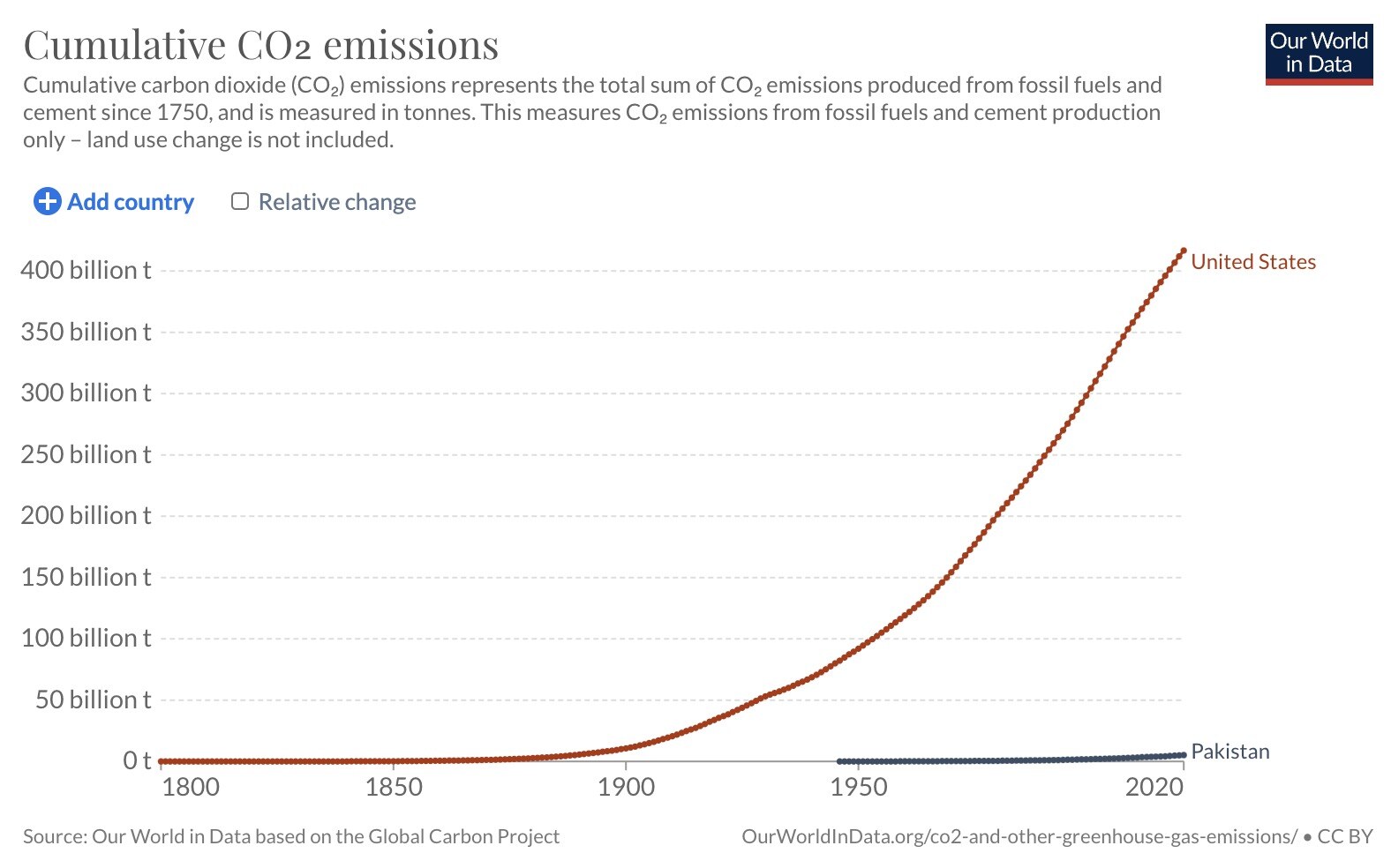
Pakistan has 220 million people, while the U.S. has 330. And yet while the U.S. had emitted 415 billion tons of CO2 by 2020, Pakistan had emitted only 5 billion, 83 times less. The average American causes 14 times more CO2 emissions annually than the average Pakistani.
Who caused the climate crisis that is now worsening floods in Pakistan? Pakistan certainly didn’t. Both in terms of how much the country has emitted as a whole and how much each individual emits, it is clear that the U.S. is by far the worst contributor to this massive disaster:
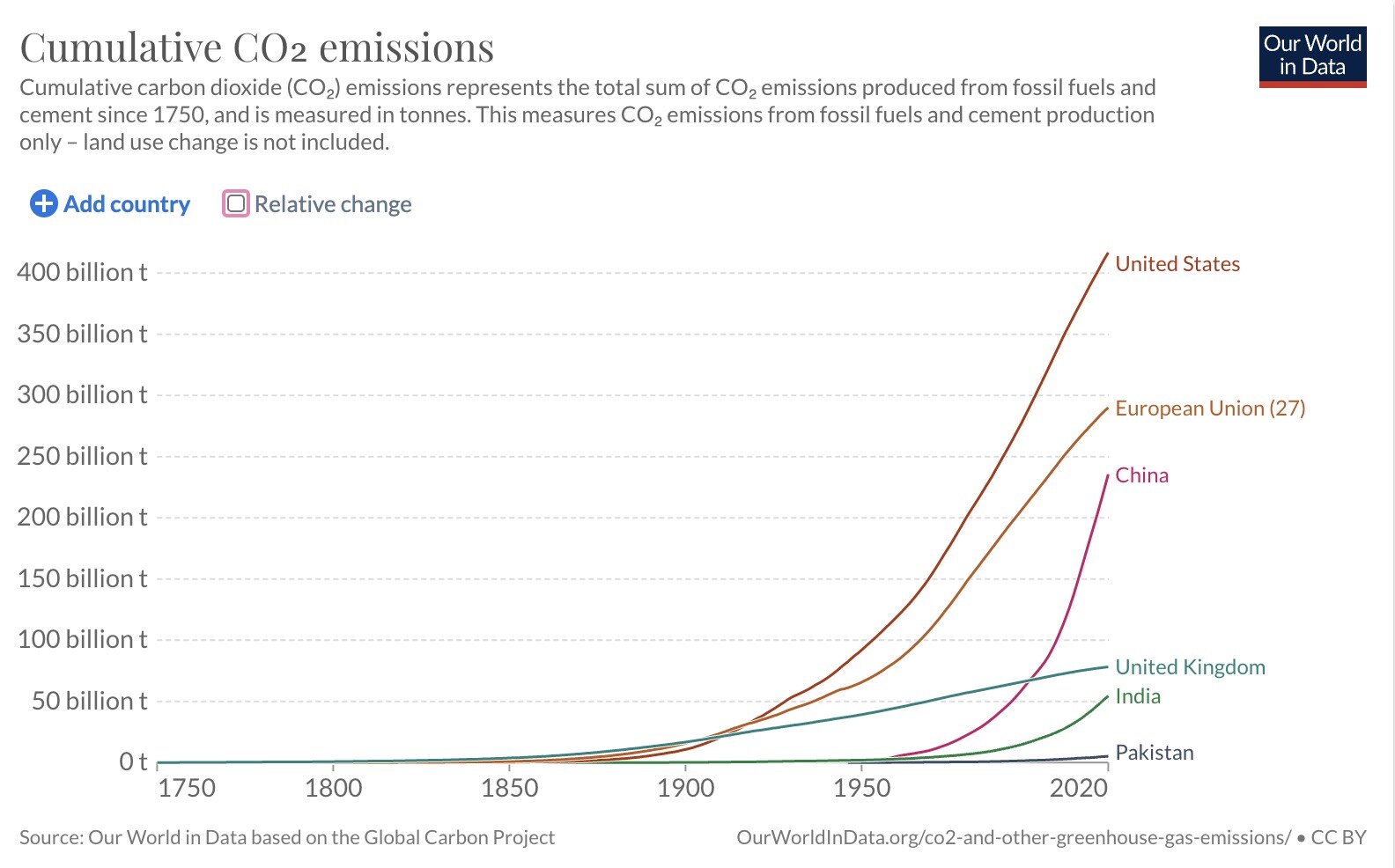
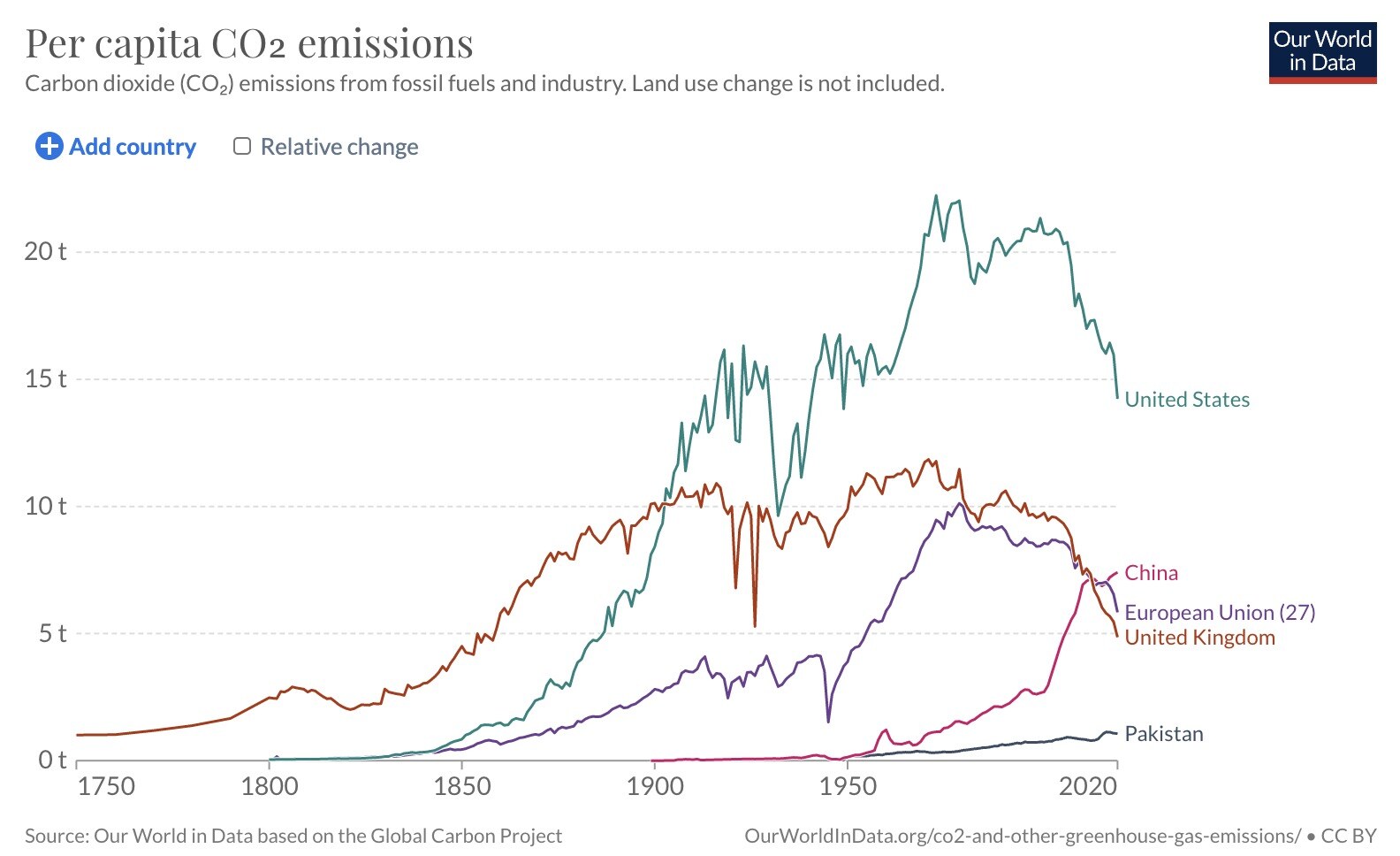
This fact is sometimes obscured by pointing to the fact that China now emits more annually than the U.S. (although this is to be expected since its population is much higher). But the facts are clear. The U.S. bears more responsibility than any other country in the world for plunging us into the nightmare of climate change.
We should think about the situation as a giant act of theft and violence committed by the richest countries against the poorest. Tort law provides a useful basic framework: if I am your neighbor and I set off fireworks that land in your yard and burn your house down, you can sue me for damages. My actions hurt you, and I am thus responsible for compensating you. If we are to take seriously the legal principle that harms create liability, then a major debate to be had about the climate catastrophe is: what do we owe the rest of the world for what we have done? What are our obligations? If we avoid this conversation, we are simply saying that huge acts of theft and violence by the rich against the poor are acceptable and will go undiscussed and unpunished.
Facing the facts honestly has deeply unsettling implications for Americans. It not only pokes holes in the American story about being a force for good in the world, but it makes a lot of our prosperity seem illegitimately acquired, because its full costs were never paid for. Essentially, as the developing world suffers from the climate disasters that the U.S. has been a primary cause of, the developing world should have a “moral lien” on U.S. wealth.
That wealth is often grotesque. I am, regrettably, a regular reader of the Wall Street Journal (I use it to keep tabs on the capitalist class) and every Friday they publish a real estate section called “Mansion.” The most recent cover story was a doozy. It reports on a 100-acre estate built for the founder of the Yankee Candle Company, which features “an arcade, tennis courts, a concert hall … a 25,000-square-foot main house, two 4,000-square-foot guesthouses, two car barns, a clubhouse, an outdoor pool and a pool cabana with a full kitchen and bar.” A “Bellagio-inspired indoor water park” has “slides, waterfalls, and palm trees,” and is located in a 55,000-square-foot building separate from the main house. The main house has 11 fireplaces and in the kitchen there are five islands and seven sinks (we are told that there is “a separate commercial kitchen on a lower level”). The house also has “four dining rooms, a 10-seat-theater, and two wine cellars.” But words cannot really do this place justice. Here are some photos:
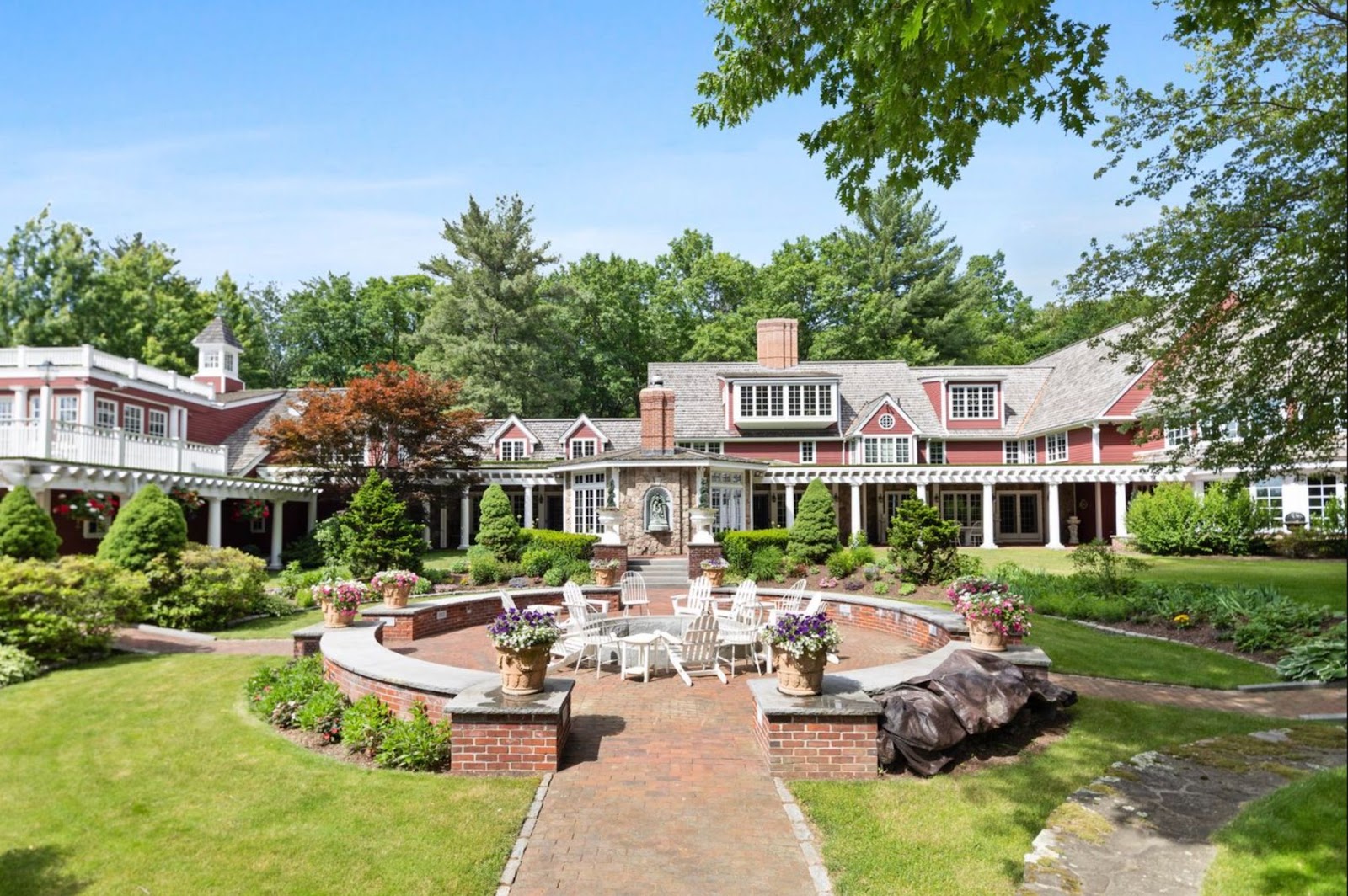


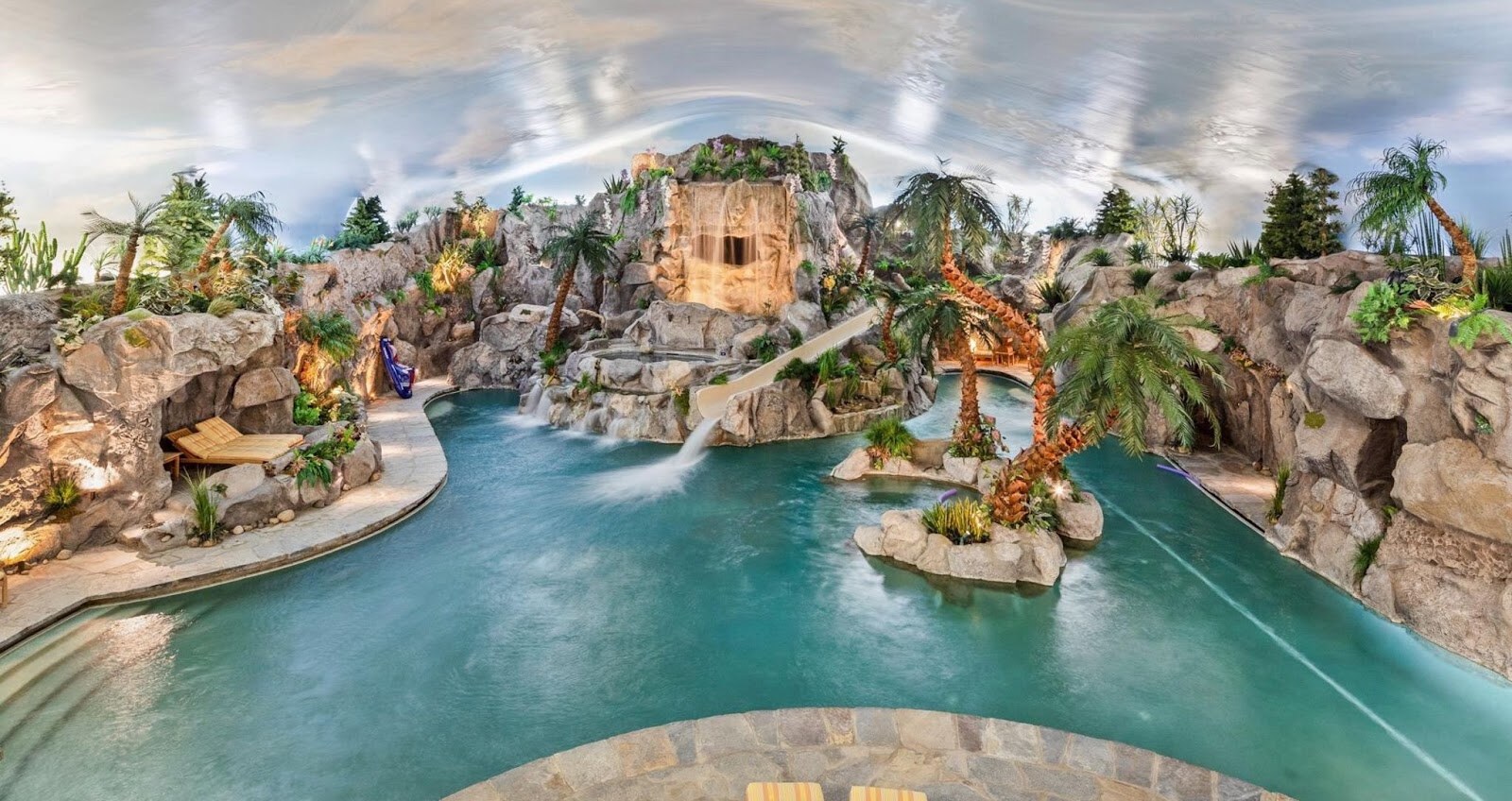






Even if climate change did not exist, this place would be a moral abomination. The other day I was driving down Calliope Street in New Orleans, which runs alongside the Pontchartrain Expressway highway overpass. For a long time, homeless people have set up tents under the overpass, but on my recent drive I was shocked to see so many tents there now. Along a one-mile stretch, you just see tent after tent. The people in them live lives of extraordinary hardship. When I see those tents, and I think about the Yankee Candle asshole who could have built houses for every one of these people, but instead chose to build his son a batcave because the little boy was having a Batman phase, my blood boils. What person with a shred of conscience can justify building a personal gaming arcade or car barn when they could easily give soft beds to people who live under highways?
But as I say, all of that is before we get to the problem of carbon emissions. Once we realize that building this nonsense not only forgoes the opportunity to build palaces for the people, but is part of the reason U.S. per-capita carbon emissions are insane next to those of everyone else around the world, the place becomes even more revolting to the conscience. People who build this kind of crap and then keep it operating 24/7 (can you imagine the energy use required to keep up the place?) are causing the climate catastrophe. They are causing harm that they are not paying for, just as if they were dumping toxic waste into other people’s drinking water.

It is not easy to face the fact that climate change means the vast destruction of poor countries’ wealth by rich countries, because facing that fact honestly confers a debt that the United States is almost certain to be unwilling to pay. People like the Yankee Candle founder with the giant mansion tend to think that they deserve everything they have and owe nothing to anybody. Once we start thinking about the question of “who is responsible” for climate change, and considering how they ought to compensate others, we are also faced with the possibility that we will have to come to radical redistributionist conclusions. In 2018, a federal judge dismissed a suit against fossil fuel companies over the harms of climate change. While accepting that “climate scientists are in vast consensus that the combustion of fossil fuels has, in and of itself, materially increased carbon dioxide levels, which in turn has materially increased the median temperature of the planet, which in turn has accelerated ice melt and raised (and continues to raise) the sea level,” the judge balked at the idea of actually imposing liability for this harm on the companies that knowingly sold products that caused the disaster. Part of the reason was that “the scope of the plaintiffs’ theory is breathtaking” and “anyone who supplied fossil fuels with knowledge of the problem would be liable.” The fact that the implication of the argument was “sweeping” seemed to disturb the judge, who said only the executive or legislative branches could deal with a problem on such a “vast scale.” The quite sensible legal theory that corporations should pay for harms that they knowingly cause, when applied to the case of climate change, leads to conclusions that are too radical and which must therefore be rejected.

The 19th century anarchist P.J. Proudhon famously declared that “property is theft.” Proudhon’s seemingly paradoxical statement actually expressed something rather straightforward: when someone encloses a piece of the commons, and defends it as their own property, they are depriving others of using it, and therefore in a sense stealing it from them. Property owners like to insist that all they are doing is protecting what is theirs against incursions by others, but in fact they are the ones doing the incursions, by using the threat of violence (i.e., the threat of using the state to enforce their stated rights) as a way of depriving others of the use of something. Proudhon asked us to see what looked like an act (owning property) that did not harm others as something that did, in fact, harm others, but in a way that was not necessarily obvious at first. Similarly, it is important to understand that climate change is a giant act of theft and destruction. When Mr. Yankee Candle runs the combustion engines of his dozens of cars, he is contributing to the decimation of villages in Pakistan without compensating his victims. We need to see this clearly, because it is the starting point for any conversation about what real climate justice would look like. Those who caused the problem need to pay for the solution. That is obvious when I burn down your house, and it should be equally obvious when the rich burn down the planet the poor must live on.




